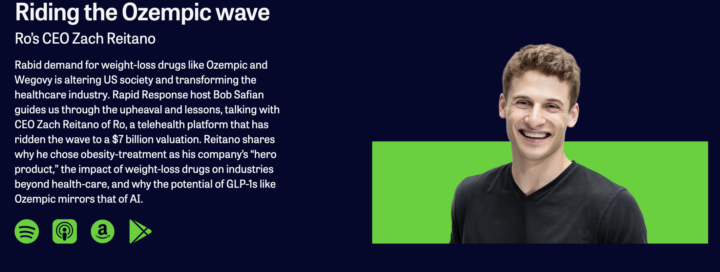In the transformative landscape of healthcare, the rise of weight-loss medications such as Ozempic and Wegovy has sparked a cultural and business revolution, challenging our perceptions of obesity and medical treatment. These drugs, originally designed for type 2 diabetes management, have unexpectedly become a beacon for those seeking weight loss solutions, leading to a societal shift that intertwines health, technology, and consumer demand.
Rapid Response host Bob Safian interviews CEO Zach Reitano of Ro, a telehealth platform that has ridden the wave to a $7 billion valuation. Reitano shares why he chose obesity-treatment as his company’s “hero product,” the impact of weight-loss drugs on industries beyond health-care, and why the potential of GLP-1s like Ozempic mirrors that of AI.
The discussion delves into the massive demand for GLP-1 medications. Reitano elucidates, “GLP-1s satisfy at Ro, what we think is they satisfy five criteria never before seen in medicine… The combination of those five things has created this unprecedented demand.” This demand is not just a matter of fashion or fleeting interest; it’s a reflection of a deep-seated need for effective, accessible healthcare solutions.
RELATED: 3 Clinical Stage Biotechs Developing GLP-1s
As the conversation unfolds, it becomes clear that this phenomenon is more than just a trend; it’s a reflection of a changing healthcare landscape where patient autonomy and telehealth are becoming paramount. Reitano’s insights reveal a world where healthcare is not just reactive but proactive, empowering individuals to take control of their health in ways previously unimaginable.
However, this seismic shift in healthcare is not without its challenges. The rapid rise in popularity of weight-loss drugs has led to shortages, affecting those with diabetes who rely on these medications for blood sugar management. Reitano’s response to this crisis is a testament to the adaptability and patient-centric focus of modern healthcare companies. “We stopped advertising because we saw that the people that were on the platform and that were currently coming in as well, we needed to devote all of our energy to making sure that they were able to get medication on a continuous basis,” he explains, highlighting the ethical considerations that come with such healthcare innovations.
This dialogue also touches on the broader implications of these drugs on society and the economy. The ripple effects are vast, impacting not just the healthcare industry but also sectors such as food, travel, and even social dynamics. Reitano’s comparison of the impact of GLP-1s to that of artificial intelligence underscores the transformative potential of these medications: “In the same way that AI is this unbelievable facilitator of leverage for society, these drugs are going to have a profound impact.”
Yet, amidst the optimism and excitement, there is a note of caution. The conversation acknowledges the complexities of addressing obesity, a condition fraught with stigma and misunderstanding. Reitano’s personal reflections on his family’s struggles with weight underscore the need for empathy and understanding in healthcare. “When people don’t understand the cause of obesity, they make the false assumption that it’s willpower, that it’s self-discipline,” he notes, calling for a shift in perspective towards obesity as a treatable condition rather than a moral failing.
In summary, the discussion between Safian and Reitano offers a glimpse into the future of healthcare, one where innovation, empathy, and adaptability converge to create solutions that not only treat conditions but also empower individuals and reshape societal norms. The rise of weight-loss drugs is not just a story of medical advancement; it’s a narrative of human progress, where technology, healthcare, and societal values intertwine to forge new paths to well-being.
